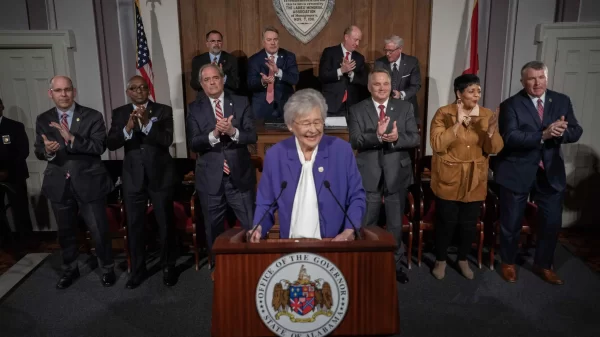By Bill Britt
Alabama Political Reporter
MONTGOMERY—Every year the State’s budget process turns into a sort of jousting match to enhance a department’s revenue. In some cases it’s a battle for survival and in others, it’s a contest of wills. In the case of the Office of the State’s Attorney General, it has even become a source of conspiracy theory.
For Fiscal Year 2015, the AG’s Office has requested funding at $23,700,000, but the line item on the Governor’s budget spreadsheet was zero.
But what are the actual facts behind the request by the Attorney General’s Office and the funding offered by the Governor and the House and Senate General Fund Budgets?
When looking at the State’s Education Trust Fund Budget or the General Fund Budget, the story is not to be found so much in the spreadsheet, but in the accompanying text.
Once again this year, the Governor’s Office submitted a General Fund Budget that had a zero in the line for appropriations for the Office of the Attorney General. In certain circles this has caused wild imaginings of a war between the Governor and the AG. Some have even gone so far as to spread a rumor that Governor Bentley was sending a political message that he wanted the Special Grand Jury investigation of Speaker of the House Mike Hubbard (R-Auburn) ended.
This is little more than fictitious court intrigue of the highest order. All public and back channel information says that the Governor is truly committed to seeing justice, not political brinksmanship, prevail, in the investigation into suspected wrong doings by Hubbard.
According to Bill Newton, Acting Director of the Alabama Department of Finance, the general public thinks of only the State’s Education Trust Fund Budget or the General Fund Budget when they are talking about funds. Newton points out that there are, “…more than 200 funds,” to be considered.
“In State government you can think of a fund like a checking account. Each department has more than one fund (more than one checking account). When you talk about the General Fund appropriation, it is not all of the money that agency has to operate. It is just one of the sources.”
This is the case with the funds available to the Attorney General’s Office.
Newton points out that the AG has a large pool of money available from the National Mortgage Settlement. This settlement is the largest consumer financial protection settlement in United States history.
According to the National Mortgage Settlement site:
“The agreement settles state and federal investigations finding that the country’s five largest mortgage servicers routinely signed foreclosure related documents outside the presence of a notary public and without really knowing whether the facts they contained were correct. Both of these practices violate the law. The settlement provides benefits to borrowers in the signing states whose loans are owned by the settling banks as well as to many of the borrowers whose loans they service.”
Each of the 49 State’s Attorney’s General were permitted to write his or her own terms for allocations for the funds from the settlement received by the state. The award and distribution of funds for the State of Alabama is as follows:
EXHIBIT B2 ALABAMA
The Court awards the State of Alabama a judgment in the amount of $25,305,692, which shall be paid by electronic transfer to the Office of the Attorney General.
Of this amount, the Court awards $2,530,569 dollars in civil penalties (or 10% of the total) as defined by and in accordance with Code of Alabama, 1975, §8-19-11 for misconduct relating to the bank’s robo-signing in violation of Alabama’s Deceptive Trade Practices Act.
The remaining amount shall be used by the Attorney General, at his sole discretion, for costs of investigation and litigation, for law enforcement efforts to prevent and prosecute financial fraud, and/or for public protection purposes, such as to defray the operating cost of any function of the Attorney General’s Office that protects citizens, whether through investigation, representation, regulation, mediation, prosecution, victims’ assistance, or consumer education concerning consumer-related financial or other crimes, or, at the sole discretion of the Attorney General, to be used for housing programs, housing counseling, legal assistance, foreclosure prevention hotlines, foreclosure mediation and investigation of financial fraud or other wrongdoing overseen by any division of the Attorney General’s Office.
In addition, the Attorney General may distribute any amount from the funds, at his sole discretion, to other governmental entities or charitable organizations whose eleemosynary purposes benefit those affected by the aforementioned misconduct.
The Office of the Alabama Attorney General has held the position that the $25,305,692 from the settlement, cannot be used for general operational expenses. It is believed that the AG has over $17,000,000 of the settlement monies on hand in a separate banking account.
The Alabama Political Reporter has tried continually to receive direct information from the Office of AG Luther Strange, but the office has limited its communications to just a copy of the terms of the agreement.
The use of the $17 million from the National Mortgage Settlement has become quite a contentious issue.
According to the General Fund Budget passed by the House, “…there is hereby conditionally appropriated up to $8,000,000 from the State General Fund. These funds are conditioned upon the Office of the Attorney General depositing all available revenue into the State Treasury.”
The $8 million in appropriations plus the $17 million being held by the Attorney General, would meet the request from the AG’s office.
Rep. Steve Clouse the House Chairman of the General Fund Budget seems to be sending a message to the AG.
In an effort to come to a resolution on the matter Senator Author Orr (R-Decatur), Chairman of the Senate F&T General Fund Committee asked that Norris Green the Director of the Legislative Fiscal Office prepare a memorandum explaining the different sides of the argument.
In summary, it is believed that the Attorney General Office should use the funds it has on hand, until they are exhausted, at which time the AG can make a request for up to the $8,000,000 that would be held by the Alabama Department of Finance to fill out the rest of the needed funds.
It has been said “off the record” that the AG’s Office finds this method troubling, as it might make the AG subservient in someway to the Executive Branch.
This brings to mind the $7.9 million that Gov. Bob Riley transferred to in coming AG Luther Strange just days before leaving office. In a report in the Gadsden Times, Dana Beyerle wrote, “ Gov. Bob Riley on the Friday before he left office in January transferred $7.9 million to the attorney general’s office to help new Attorney General Luther Strange as he entered office. The money revenue received related to the BP oil spill clean-up. The rumors surrounding this transfer of funds has become legend around the Capitol.
Some say Riley cut a deal with Strange to go after gaming magnate, Milton McGregor. Other’s say it was a gift to keep the AG from ever looking into potential wrong doings by the Riley clan. But, like all rumors around the State House, they must be treated as mere gossip.
As for the funding for the Attorney’s Office: Acting Finance Director Newton says, “The Attorney General’s office has ‘other funds’ from which to operate in 2015. So, the Governor’s proposal did not zero out the Attorney General’s office, it zeroed the appropriation from the General Fund. It included a proposal for funding from these other funds, and they have quite a few over there.”
During the National Mortgage Settlement Agreement process, each of the 49 State’s Attorney’s General were allowed to write the conditions for allocations of their portion of the settlement.
According to the National Conference of State Legislatures, Alabama used only $3,865,956 or about 15 percent of its settlement funds for mortgage or housing-related issues.
A Breakdown by USA Today showed that Texas put almost all of its entire $135 million into the State’s general fund budget and then spent it on non-housing issues. The State of Georgia set aside its entire $99 million for economic development and Nebraska placed its entire $8 million into its rainy day fund.
According to a synopsis by USA Today, “Connecticut, allotted $22 million of its $26 million on emergency mortgage assistance. While Colorado spent nearly half of its $50 million to help homeowners modify their loans, and the rest of the money on counseling and legal services. Also Pennsylvania set aside 90 percent of its $67 million for its housing finance agency.”
Strange’s Office has not made clear what it wants to do with what remains of the settlement it received. Again the AG’s office has refused request for information.
It appears that the Governor and the budget Chairs want to see Strange use the funds for operating his office.





















































